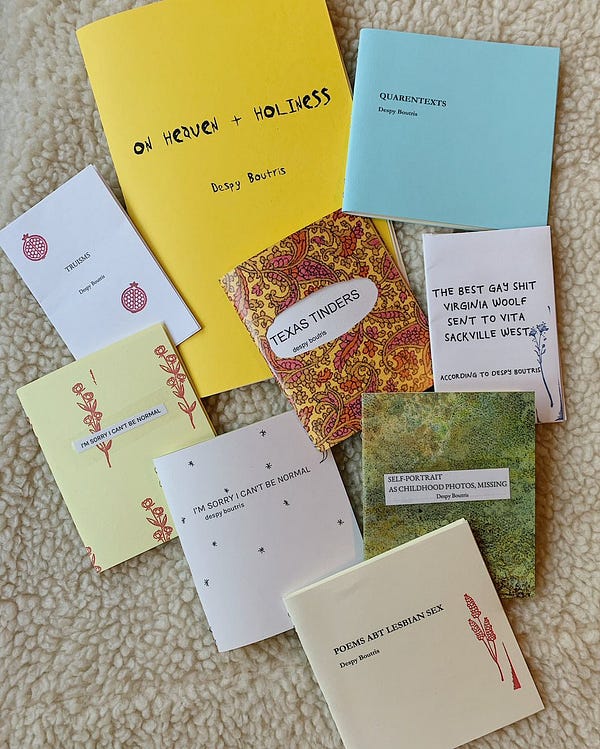round-up: 3/14
Happy Monday, all! I hope you’re well.
Here’s what I have for you today:
Housekeeping
What I’m reading
Quotations
Tweets
Housekeeping:
What I read last week:
Radical Accountability, Radical Transparency, Radical Action, Be Oakley
To read:
The Unbearable Whiteness and Fatphobia of “Anti-Diet” Dietitians
“I TEACH MYSELF IN OUTLINE,” NOTES, JOURNALS, SYLLABI & AN EXCERPT FROM DEOTHA
Quotations:
I actually have been writing since 2015 on my demise but not yet through a queer eye though mine is always so queer it’s funny I could say that.
-Barbara Hammer, “Barbara Forever” (Every Ocean Hughes)
My artistic life has prepared me to want a conscious death due to my longstanding practice of wanting to know everything, face the unknown, discover the hidden and reveal disguise. From the beginning I never accepted that my lifestyle should be an anomaly or something to hide. It was a breakthrough for me to come out as a lesbian in 1970 and I thank the feminist movement at that time for making lesbian visibility a “thing.”
-Barbara Hammer, “Barbara Forever” (Every Ocean Hughes)
Queer is a term that sets out to question normative, and especially heteronormative, systems and relations within society. Queer Theory understands gender and sexuality as relational constructs, subject to historical and cultural variation. Because the idea of “queer” tries to go beyond the idea of a permanent and stable identity, it works to connect sexual orientation to other forms of identity rooted in the unstable ideological quagmire of “orientation,” such as race, age, or ethnicity. In this way, it incorporates the idea of intersectionality, showing how multiple modes of identification cross-pollinate.
-Queer Curating, Issue 37
From Dan Cameron’s very early Extended Sensibilities in 1982—a queer exhibition that strenuously avoided using any queer nomenclature in its title—to Jonathan Katz’s 2010 Smithsonian exhibition Hide/Seek: Difference and Desire in American Portraiture (that notably did the same), the question of nomenclature has been a defining problem in queer exhibition making. In part this is because of fears of a prejudicial response, but it also reflects the rapid mutation of language referencing same-sex desire, and more to the point, its shifting ontological/ideological ground.
-Queer Curating, Issue 37
In distinct contrast to most minority politics, where representation and demographics are the key terms of contestation, in the art world, queer presence is hardly either marginal or something new. In fact, queer artists crowd our museums, and queer staff are central to the provision of modern exhibitions. The question here, in short, isn’t about literal presence; it’s about discursive presence, about how often, or not often, queerness is named, defined, or referenced.
-Queer Curating, Issue 37
First: Queer exhibitions and queer curating interrogate the passive position of the viewer and demand active engagement, honest investment, and frank questioning, while also leaving room for unanswered questions, gaps, and fissures. Secondly, queer curating addresses the productive role of the body and its (queer) desires, even if the terms of that address are non-representational, and even utterly abstract. Third, queer curating must necessarily question and challenge the normative structures of the museum itself by addressing questions of the archive, collecting, and education as well as acknowledging and addressing a “queer” audience. Queer exhibitions disrupt any notion of a singular, unified, homogeneous audience, in favor of a plurality of audiences with a plurality of interests, experiences, and competencies. When conceived as multiple, audiences can register and produce very different kinds of knowledges.
-Queer Curating, Issue 37
For more than 30 years now, New York’s Guerrilla Girls have been decrying this scandalous fact: “Women have to be naked to get into museums!” With numerous interventions, they have highlighted massive gender and ethnic biases in museums around the world. The Girls still have every reason to rage. In their intervention into the 40th anniversary of the Museum Ludwig Cologne in 2015, only 11% of the museum’s collection were works by women,*(the asterisk is intended to suggest the insufficiency of an identity term we must nonetheless use) only 3% were from women of color, only 20% of the solo shows since 1989 were dedicated to female* artists, and only 1% to nonwhite female artists. Despite the fact that 14% of Cologne’s population has a “migrant background,” only 1% of the collection of the city’s most important art museum contains works from such artists.
-Birgit Bosold, “How Could This Have Happened?: Reflexions on Current Programming Strategies of Schwules Museum Berlin”
Could it be possible that the AIDS crisis wasn’t at all the catalyst for fabulous, subversive new alliances, but rather caused the hijacking of the radical queer resistance by white, cis-male players? This was a hotly contested point put forward in Dean Spade’s recent project Queer Dreams and Nonprofit Blues.
-Birgit Bosold, “How Could This Have Happened?: Reflexions on Current Programming Strategies of Schwules Museum Berlin”
We live by sharing what little we have with those who are needier still. […] It’s like being part of a river—we pass on to those below us just as we receive from above, the flow continues without end.
The collective self-determination of gender will be a revolutionary achievement of the highest order. Gender is currently where the work of class reproduction gets naturalized. Though it is experienced as deeply personal — as the essence of personhood, even — it is one of the central mass political experiences in capitalist society. Gender is imposed, stabilized, and reproduced through a material infrastructure distributed across the social, in private places like the family or sexual intimacy and public places like the street, and in moments like access to the labor market and in relation to sexual violence. To be free to live out gender however we want means to be free of the fear of violence that guards these places and moments, to be free of the need to work for someone else to reproduce our lives — to be free of class society.
Tweets:







-Despy Boutris

























